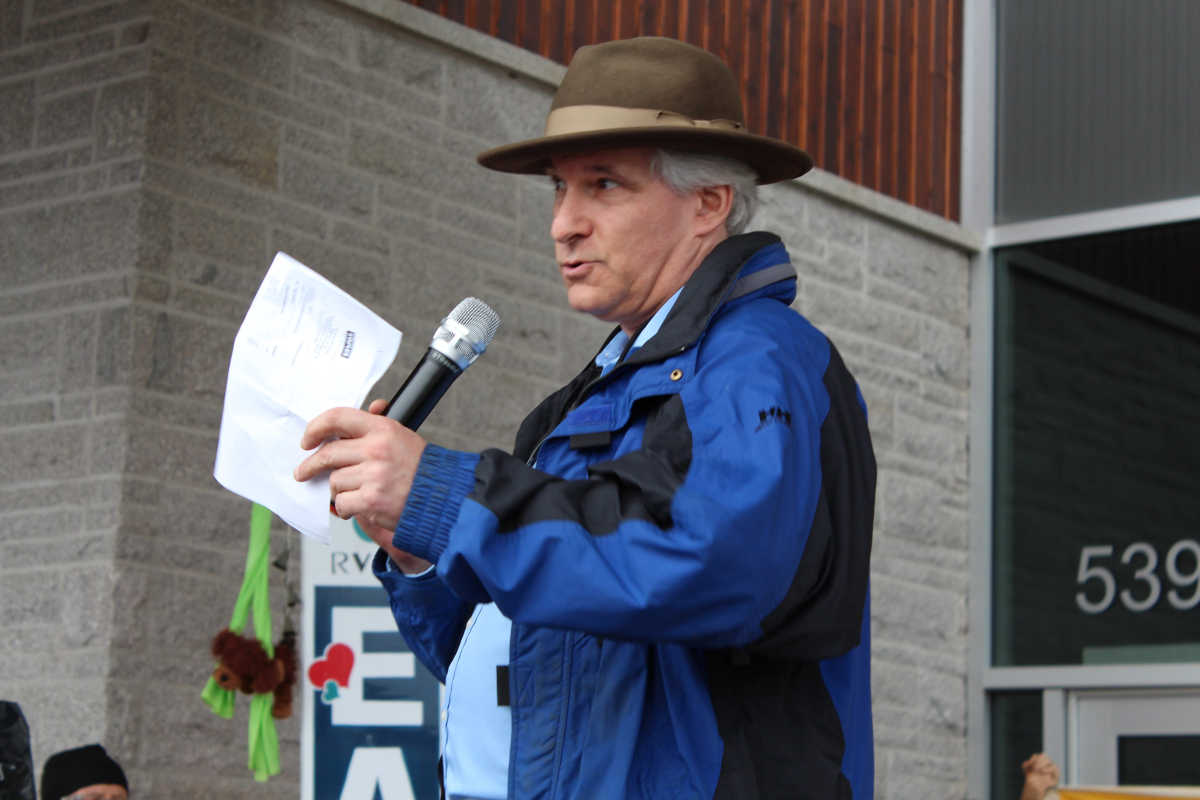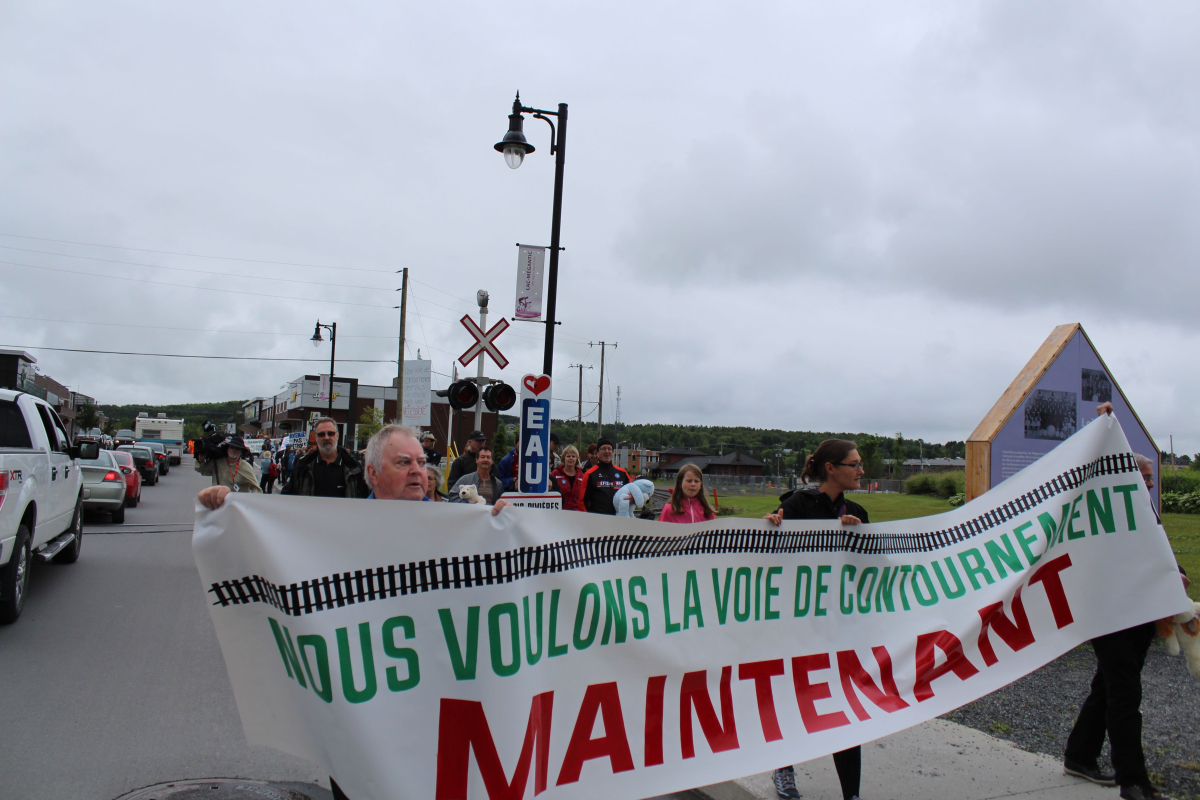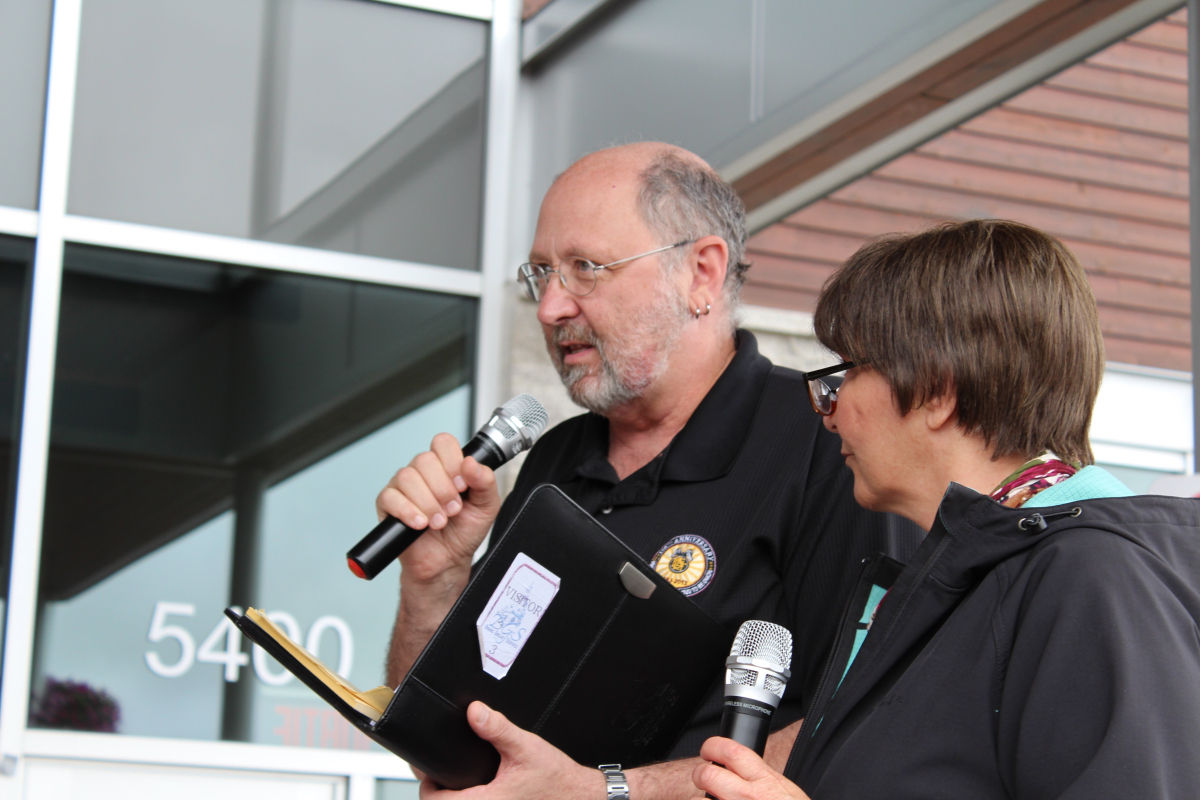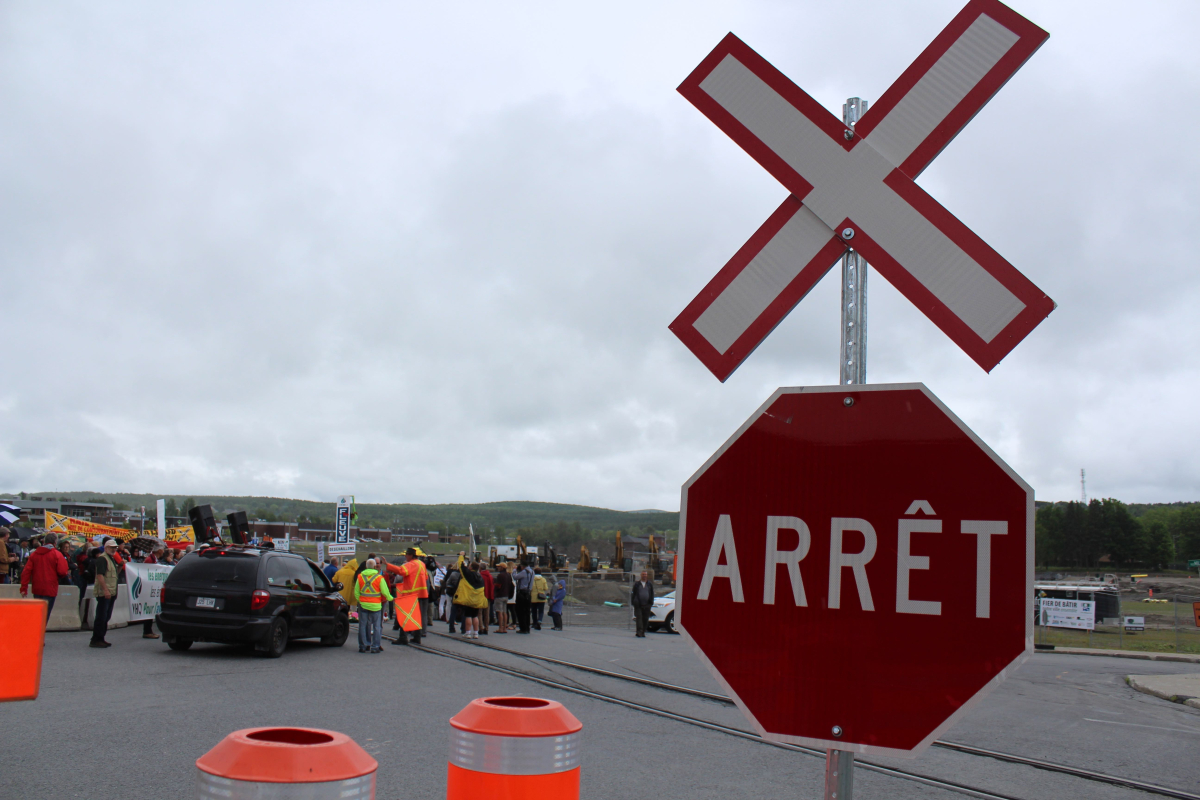Jo-Annie loved owls
Text by Krystle Alarcon. Photos by Mike De Souza. Lead photo shows Diane Bélanger and her partner Pierre Morin outside Maison de Jo-Annie, a bed and breakfast chalet in Lambton, Quebec on July 10, 2016.
Summer is a tough time for Diane Bélanger.
While most people celebrate shorts weather and the sweet smell of new grass, the season brings back painful memories of her 20-year old daughter, Jo-Annie Lapointe.
Jo-Annie died when a runaway train carrying crude oil derailed and exploded in Lac-Mégantic on July 6, 2013, taking the lives of 47 people.
When Bélanger speaks of Jo-Annie, her voice trembles and she searches for words. But she speaks in a fast pace – as if to avoid certain topics – and she jumps from thought to thought sometimes incoherently. It's clear that talking about the loss of her youngest child makes her anxious.
“The start of the summer is always the hardest,” Bélanger says. “But I try not to think of the tragedy. I try to think of my daughter. I don’t even think of who to blame for it. What will it do for me? Will they help me? I don’t think so.”

She questions herself, constantly looking for ways to cope.
Bélanger speaks to National Observer in her bed and breakfast chalet called Maison de Jo-Annie, that she named after her daughter. It's just 25 minutes away from Lac-Mégantic in Lambton, Quebec. The walls are dotted with figurines of owls hanging on the walls in the lobby, kitchen and bathroom.
Jo-Annie loved owls. She was a promising child, studying social sciences in college. She was the ‘cadette’, the youngest, Bélanger says in Quebec French, what some people call ‘Quebecois du bois (of the woods).’
Bélanger says her two other daughters and grandchildren help her carry on. But her unanswered questions make it difficult for her to move on – a sentiment that many Lac-Mégantic residents share.
Unanswered questions
Lac-Mégantic resident Marilaine Savard speaks to National Observer at Musi-Café on July 10, 2016.
Despite the grey clouds and drizzling rain, hundreds gather in front of their local recreational centre on July 10, calling on Prime Minister Justin Trudeau to fast track a project to protect Lac-Mégantic. They want a new bypass for the railway tracks to ensure that the trains go around and not through the municipality.
They've joined a coalition of citizens for railroad safety and believe the proposed bypass could be a permanent solution to protect the town as it continues to rebuild.
But these aren't easy times for the people of Lac-Mégantic. Whether they're seeking more access to mental health services, financial compensation for economic losses, or finding those responsible for the tragedy – many residents say they feel left in the dark.
They also want to make sure what happened in 2013, doesn't happen again - to their town or to any other for that matter.
Members of the coalition consider what happened to them as a warning for the entire province. They believe everyone should be weary of all large fossil fuel projects. TransCanada Corp.'s proposed Energy East pipeline - now under federal review - is one of the ideas that they believe should never see the light of day.

“What will we do the next time six million litres or more of oil spills into another Quebec community? Lac-Mégantic will provide all the lessons for the future. It should be a national project to see what worked and didn’t work in Lac-Mégantic,” says Daniel Green, environmental toxicologist and the deputy leader of the Green Party of Canada, at the event.
Companies such as Alberta-based TransCanada have said that safety is a top priority for their employees and that they can pursue development, while creating jobs and protecting the environment.

But Marilaine Savard, a resident of Lac-Mégantic and member of the coalition, says there’s only one way to prevent history from repeating itself. “We want renewable energy! We want a train bypass but the ultimate message is we want to leave fossil fuels in the ground," she yells into a microphone. The crowd cheers her on.
Savard leads the group toward a wooden pathway about two metres parallel to the train tracks, which was built to commemorate the 2013 tragedy. At the end of the boardwalk, residents place stuffed toys along the tracks. Savard says the gesture was meant to symbolize the two children who died and the 27 who became orphans because of the derailment.
After the event, residents slowly trickle into Musi-Café, a rebuilt version of a local bar where 30 victims died, three of which were employees – including Jo-Annie Lapointe.
Derailed dreams and recurring nightmares
Yannick Gagné stands outside his Musi-Café bar in Lac-Mégantic on July 10, 2016.
The bar’s owner, Yannick Gagné, greets the coalition members. He also supports a bypass explaining that it will give the town some peace of mind.
“We want a bypass because we want to get our lives back, we’re always in a bad mood now. There are still people who are lost, who still can’t handle it every time a train passes by,” Gagné says.
He admits he’s gotten more aggressive since that fatal day in July 2013 and says he even needed to seek help to ensure that his temper wouldn't land him in jail.
“I’m less patient with clients who I have to confront if they get rowdy. I used to be able to go up to someone and say, ‘calm down, let’s take it easy.’ Now, I put my hands on their shoulders and sometimes resort to physical force to remove them.”

Gagné gets shaken up whenever he sees media coverage on any of the three employees he lost in July 2013. “It hurts, it troubles me. I always think maybe I shouldn’t have left the bar. Because it happened just a few minutes after I left… that maybe if I stayed I could’ve helped to extract more people out,” he says.
“And there’s no escaping it. It’s all over the media. Even when I go to the United States I see stories on Lac-Mégantic sometimes,” he adds.
On top of the psychological damage, Gagné says he still hasn’t recovered financially. He’s around $800,000 in debt after rebuilding Musi-Café.
Gagné says he received some funds from the federal and provincial governments to relocate the business, but he has not yet received compensation for economic losses. “Everyone (business owners) had to invest more money on top of the debts we already had. To reconstruct from the ground up always costs a lot of money.”
He says he’s currently waiting on the results of a lawsuit for the economic damages, represented by lawyer Hans Mercier, who sought $460 million for the families of victims.
Holding the culprit accountable
An activist at a rally in Lac-Mégantic on July 10, 2016 holds a sign calling for a clean up at Transport Canada to improve railway safety.
The coalition also wants some accountability.
It believes the wrong people are being blamed for the tragedy.
Karl Edler worked on American railroads for 37 years as a repairman and conductor. He came to Lac-Mégantic to support the coalition’s call for a bypass, in the wake of increased train derailments in the U.S. since Lac-Mégantic.

Edler says the Railroad Workers Union understand what’s at stake. “On May 1 in Washington D.C., my hometown, we had a freight train derailment. It spilled hazardous materials within a short distance of everyone’s homes. Just a couple of weeks ago in Oregon, an oil train exploded and burned. All of these incidents share a lack of oversight,” he says at the event, while his words are translated into French.
Later, he shares a beer at Musi-Café with Andre Blais, a retired high school teacher, following the coalition’s event.
He tells Blais about how he’s seen the industry change over the years. “There used to be as many as five people onboard a train for rail transport. There was only one person on the train at Lac-Mégantic, carrying almost the most dangerous material you can imagine. The only thing worse would be chlorine gas,” he tells Blais, speaking slowly with his southern American accent.
Blais agrees that the conductor, Tom Harding, shouldn’t be the one pinned for the derailment. Harding, along with three other men, are facing criminal charges of negligence causing death.
Robert Grindrod, the former railway company president, and two executives, Ellen Labonte, are also facing charges for allegedly violating federal railway safety and environmental laws. But all have pleaded not guilty.
“We feel that the train companies and the petroleum companies are giving more attention to their shareholders than to the people whose lives they ruined,” says Blais.
“It is unconceivable that people like the past president of the MMA [Montreal, Maine and Atlantic Railway] Ed Burkhardt, is not held responsible of the tragedy,” Blais affirms.
He and other coalition members believe former Prime Minister Stephen Harper and the heads of MMA, which filed for bankruptcy following the disaster, should be held accountable for the loosened rules and deregulation, which they say reduced federal oversight and caused the derailment.
Transport Canada told National Observer that it introduced more stringent safety rules in the wake of the Lac-Mégantic accident that require industry to physically secure trains and slow down speeds when approaching highly urbanized areas. It has also hired more inspectors while strengthening safety rules, including the standards for railway tank cars and the tracks. Soon after the July 2013 tragedy, it also required all trains carrying dangerous goods to have a minimum two-person crew on board.
The new owner of the railway tracks has also invested millions to improve safety and is hoping to resume shipments of crude oil in the future, the CBC reported.
Burkhardt has said he believed his company was following the rules.
Politicians pushing for bypass
Parti Québécois MNA Alexandre Cloutier applauds speakers at rally in Lac-Mégantic on July 10, 2016.
Although the Sunday gathering attracts at least one high-profile politician, Parti Québécois leadership candidate Alexandre Cloutier, Many of the local elected officials are absent, including Lac-Mégantic Mayor Jean-Guy Cloutier and city councillors.
But speaking later to National Observer, Mayor Cloutier says the council has been working on getting a bypass.
“Minister of Transportation Marc Garneau agreed to meet us, he’s just waiting for us to get our work plans ready. And then for sure we should be able to meet Trudeau himself,” he explains.

The mayor says he and his council just don’t agree with activists who believe they need to protest to get the bypass built. “We spoke to Robert Bellefleur, (one of the main organizers) and exchanged letters. It’s not that what they do is improper or wrong, it's just that we want to follow due process and work with the government,” the mayor says flatly.
Bellefleur and the other speakers at the rally are concerned, based on a feasibility study done by the municipality, that they'll have to wait until 2022 before seeing the bypass completed.

But the mayor argues that date is inaccurate. “If we have the government subsidies, by 2022 it should already be done. I just don’t want to say anything negative to the population (about dates) and it’s not necessarily valid,” he said.
However, Mayor Cloutier could not provide any exact dates for the project.
Finding closure
Diane Bélanger stands outside her bed and breakfast chalet on a rainy morning in Lambton, Quebec on July 10, 2016.
Mayor Cloutier also has faith that Quebec’s Health Department will help the town recover.
“This week or next week they will send three workers to solicit people and provide counseling,” he says.
Those three workers include a social worker, a community organizer, and a social services technician.
Quebec’s public health authorities provided the group therapy sessions following a study that found 67 per cent of the population were suffering from PTSD. However, the group counseling has been gradually terminated – now providing only individual sessions.
It was this kind of therapy that worked for Diane Bélanger. She attended the session for about a year and a half with two other mothers who lost children.
“We met up and talked. We laughed and cried at the same time,” she says of the group therapy.
On the first day, one mother took her into her arms right away. “It felt so right. I sighed. It’s like I didn’t even have to explain myself. There was an instant connection,” Bélanger says.

She was surprised there were only three of them at the sessions, and suggests that others may be choosing to mourn on their own.
When asked if she believes governments should offer additional group counseling, she says she understands why others would like more. But she says she doesn't feel she needs any more counseling now for herself.
“After a while, you have to move forward. Am I going to go through my whole life with this throbbing pain?
Yes, but I have to move. I have to find motivation to continue.”
